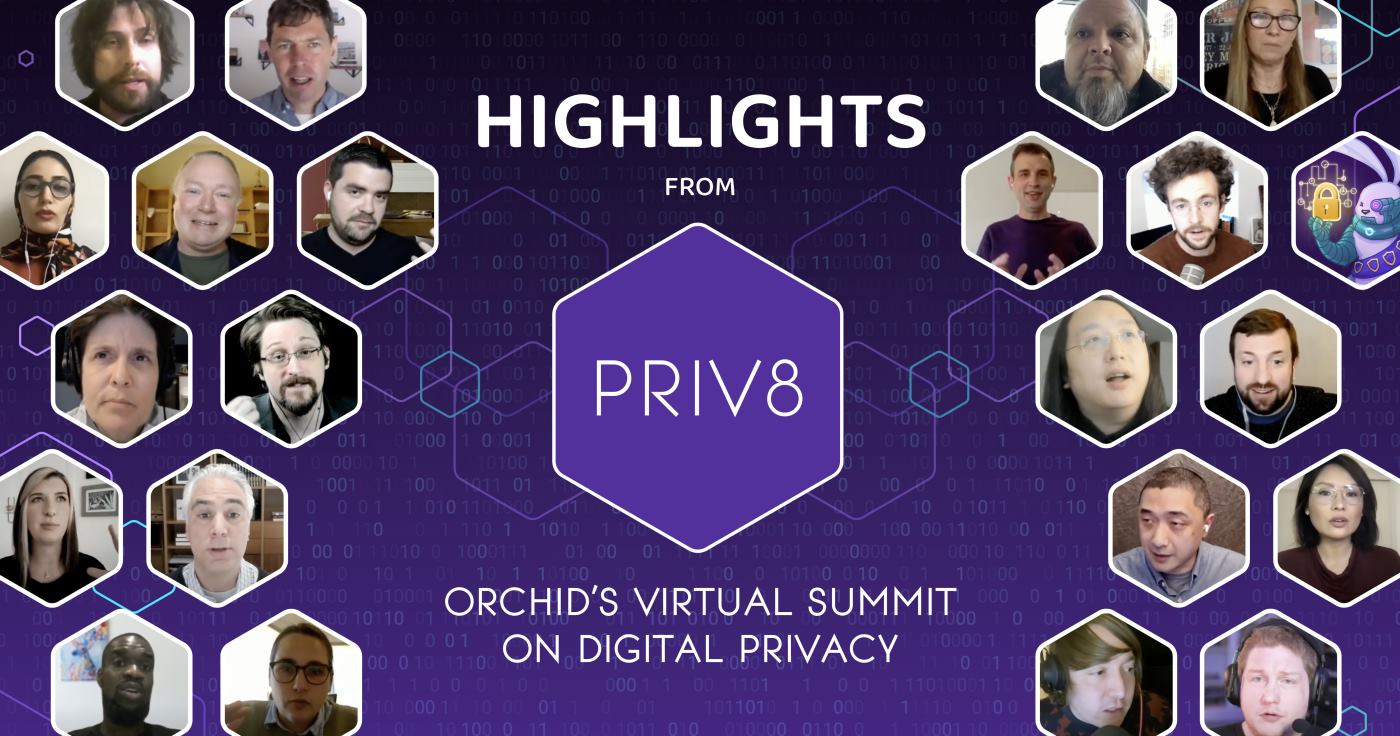
Highlights from Priv8, Orchid’s virtual privacy summit
Mar 31, 2021Last Thursday marked the final day of the Priv8 Virtual Privacy Summit. The first-of-its-kind event brought together experts, academics, and evangelists from around the world of privacy for an eye-opening week of panels, discussions, and sharing of insights. For those of you who missed it, here are the highlights.
Day One
Edward Snowden didn't disappoint with his inspiring talk about how we can remake the Internet---and why that involves remaking society itself. In Snowden's conception, the Internet reflects and amplifies the status quo -- and therefore, a broken Internet is reflective of a broken society.
Snowden observed that technology's ability to magnify power can also create unsustainable imbalances, leading to situations like the birth of Bitcoin: "You get some weirdo like Satoshi Nakamoto writing a paper and sharing it with other weirdos on a cypherpunk mailing list."
Joining Snowden in conversation was the EFF's Cindy Cohn, who pointed out online freedom of speech cannot exist under monopolistic conditions. "We can't have it with five platforms. We need distributed platforms for all sides," she said.
Orchid's co-founder and CEO Dr. Steven Waterhouse -- known to most as Seven -- prompted Snowden for advice for cryptocurrency builders. Snowden's observation: "One of the most encouraging things about the cryptocurrency space is that they understand the value of decentralization ... Everything we've been talking about is about the concentration of power. Decentralization rejiggers all those levers."
Snowden elaborated: "Jerome Powell was saying the other day that bitcoin isn't really a threat to the dollar ... but he's missing the forest for the trees ... if government money and centralized platforms fall out of favor for a decentralized authority, all of the privileges of the modern world granted to centralized authorities evaporate. That is a very different world, and it is very far away from what it appears to be. But when that movement begins, it can happen very quickly.
"All of us, the people working in the space, we decide the moment that movement begins ... It's natural to recognize it's going to be risky and disruptive, but we have to ask ourselves, what are the consequences and the costs of inaction? Of failing to move?"
Snowden signed off with a salient reminder in these days of the pandemic: "Every time we do one of these things, I always tell people, don't stay safe---stay free."
Later on Decrypt's Jeff John Roberts, moderating, asked participants in a panel on Covid policy responses for the best privacy projects they had come across recently: Anne Fauvre-Willis of Oasis said it was the Brave browser and Apple products; the Linux Foundation's Brian Behlendorf name-checked the government of Sierra Leone's privacy-preserving credit score system; Wharton's Kevin Werbach raised eyebrows with the Chinese government's explorations with "controllable anonymity."
The opening session on building your own Internet featured insights from Bridgefy's Jorge Rios, who has seen a surge in downloads of his mesh networking app in Myanmar; Nym's Harry Halpin discussed the finer points of privacy and anonymity, plus his work in Rojava; while Mattereum's Vinay Gupta talked about the notion of "identity escrow." The session was guided by Adriana Hamacher of Decrypt.
Day Two
The conversation between Taiwan's digital minister Audrey Tang and New York Times columnist Kara Swisher was probably the most informationally dense session on a very informationally dense day. Minister Tang kept dropping amazing metaphors, so we'll share a few of them from the session:
Sousveillance - A participatory self-surveillance, exemplified by the Taiwan government's "co-creation" efforts with hostess bars and nightlife districts to capture information anonymously on physical scratch cards that were destroyed after four weeks.
Memetic engineering - Using memes to influence public actions. For instance, the government told everyone to wear a mask to prevent the accidental spreading of virus from their own hands to their face---not to protect other people from the virus. It worked.
Infodemic - The spread of misinformation and disinformation. Combatted by memes -- including one highlighting the Taiwanese premier's bathroom activity -- in response to a conspiracy theory that toilet paper was being used to make face-masks. Swisher confirmed that Bill Gates was not putting chips in vaccines to track people.
Nerd immunity - Just as herd immunity prevents viral transmission, nerd immunity prevents disinformation transmission. Crowdsourcing fact-checking and other civic work creates nerd immunity.
Minister Tang's greatest worry from this pandemic? That the surveillance state and surveillance capitalists seize the moment to build a "new normal" forcing people to give up individual privacy and agency. "Other jurisdictions in the world may falsely think that top-down lockdowns are the only way to counter a pandemic or infodemic," Tang said.

The impossible happened when STABLE Act co-author Rohan Grey, Coin Center's Peter Van Valkenburgh and FT Alphaville's Izabela Kaminska all agreed that cash is good, and especially good at preserving privacy. A disagreement emerged towards the end of the chat around whether the private sector and privately funded technology is the way forward or not, but the session -- perhaps unexpectedly -- revealed a good deal of consensus.
Three builders talked about their tools to preserve privacy after the pandemic:
Jen Zhu Scott described how Common Pass would keep your health data on your phone, not on the cloud, so that international travel can take place. She's talking to over 30 ministers and prime ministers about the project.
Micha Benoliel discussed Coalition Network, his blue privacy-preserving contact-tracing system that relies on bluetooth technologies instead of the Internet.
Cade Diehm of the New Design Congress gave a wide-ranging overview of his research into the socio-technical systems governing privacy: don't think about devices, but think about micro economics and social networks.
Messari's Ryan Selkis then convened the group for a discussion about solutions to privacy post-pandemic. To illustrate how difficult it is to come up with a convenient and privacy-preserving solution, he used a metaphor: if there are 12 standards operating today, and people say they want to unify them, inevitably they end up with 13 standards at the end of the process.
Last but not least, Priv8's NFT drop was announced, with custom art and other benefits, by Orchid's own Chad Soren Harper. A special appearance from Orchid co-founder Saurik capped it all off.
Day Three
Fereshteh Forough of Code to Inspire and Yele Bademosi of Bundle Africa have both experienced the tradeoffs between financial privacy and electronic transactions in their home countries of Afghanistan and Nigeria, respectively. They discussed how the need for the former impacts the global protest movement in an engaging and thought-provoking conversation.
ZCash inventor and digital cash pioneer Zooko Wilcox gave a talk on how to reframe thinking about financial privacy, entitled A Better Way to Think About Financial Privacy. Journalist Bailey Reutzel joined him for a Q&A that produced a wide-ranging discussion.
Ken Liu spoke with Orchid's own Seven about privacy and technology in new ways, through the lens of storytelling, in a conversation about The Stories of Values and the Value of Stories. Ken is the acclaimed sci-fi writer who invented the "silk punk" genre and translated Liu Cixin's The Three Body Problem. He's also a former litigator and programmer.
Finally, on Thursday it was announced that Orchid is now multi-chain compatible. Users can purchase bandwidth using xDAI and other EVM-compatible chains, lowering the cost of Orchid to as little as $1. Download Orchid here.
Toward a better future for privacy
Priv8 was a resounding success thanks to the brilliant insights and outside-the-box thinking of our many talented speakers. We also owe a huge thank-you to the thousands who registered and attended the event -- after all, it's only through passion and engagement from the broader community that the cause of privacy can move forward. We are grateful to everyone who participated, and hopeful that momentum will continue to build around the world for a truly free and open Internet.
Download the Orchid app today to start exploring the Internet freely.
If you enjoyed this blog, subscribe here for privacy news, commentary, and product updates from Orchid.



